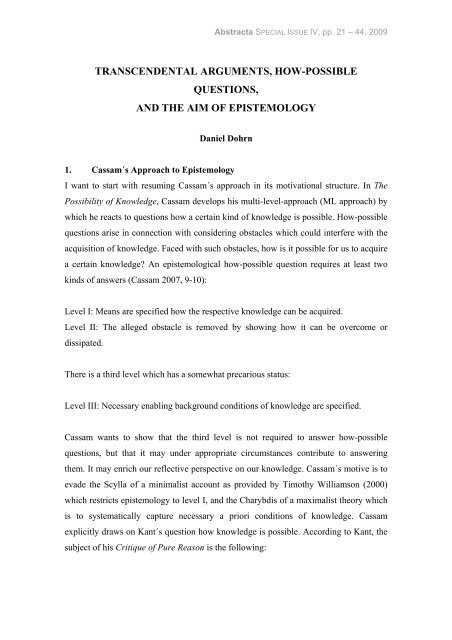Complete Issue in PDF - Abstracta
Complete Issue in PDF - Abstracta
Complete Issue in PDF - Abstracta
Create successful ePaper yourself
Turn your PDF publications into a flip-book with our unique Google optimized e-Paper software.
<strong>Abstracta</strong> SPECIAL ISSUE IV, pp. 21 – 44, 2009<br />
TRANSCENDENTAL ARGUMENTS, HOW-POSSIBLE<br />
QUESTIONS,<br />
AND THE AIM OF EPISTEMOLOGY<br />
Daniel Dohrn<br />
1. Cassam´s Approach to Epistemology<br />
I want to start with resum<strong>in</strong>g Cassam´s approach <strong>in</strong> its motivational structure. In The<br />
Possibility of Knowledge, Cassam develops his multi-level-approach (ML approach) by<br />
which he reacts to questions how a certa<strong>in</strong> k<strong>in</strong>d of knowledge is possible. How-possible<br />
questions arise <strong>in</strong> connection with consider<strong>in</strong>g obstacles which could <strong>in</strong>terfere with the<br />
acquisition of knowledge. Faced with such obstacles, how is it possible for us to acquire<br />
a certa<strong>in</strong> knowledge? An epistemological how-possible question requires at least two<br />
k<strong>in</strong>ds of answers (Cassam 2007, 9-10):<br />
Level I: Means are specified how the respective knowledge can be acquired.<br />
Level II: The alleged obstacle is removed by show<strong>in</strong>g how it can be overcome or<br />
dissipated.<br />
There is a third level which has a somewhat precarious status:<br />
Level III: Necessary enabl<strong>in</strong>g background conditions of knowledge are specified.<br />
Cassam wants to show that the third level is not required to answer how-possible<br />
questions, but that it may under appropriate circumstances contribute to answer<strong>in</strong>g<br />
them. It may enrich our reflective perspective on our knowledge. Cassam´s motive is to<br />
evade the Scylla of a m<strong>in</strong>imalist account as provided by Timothy Williamson (2000)<br />
which restricts epistemology to level I, and the Charybdis of a maximalist theory which<br />
is to systematically capture necessary a priori conditions of knowledge. Cassam<br />
explicitly draws on Kant´s question how knowledge is possible. Accord<strong>in</strong>g to Kant, the<br />
subject of his Critique of Pure Reason is the follow<strong>in</strong>g:




